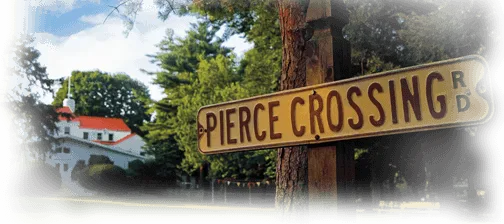Greetings from Camp! It was a great first week of camp. Check out our first day video! The best is yet to come =)
Category Archives: Camp News

Pierce Celebrates 100th Summer in Style
Cousins Will Pierce and Courtney Pierce Philippou grew up on the Pierce Country Day Camp property. They lived there, they went to camp there, and now they’re back as fourth-generation owners and directors of the 100-year-old summer camp in Roslyn.
“Since I was a little child, I’ve grown up here. I was a camper here, I went to our sleep-away Camp Birchmont in New Hampshire; this is my backyard,” Philippou said. “I’ve had so many personal memories. We live and work here on the grounds. Not only is it my backyard, but it’s a wonderful place for the campers and staff to come every day and make their own memories.”

Founded by their great-grandfather Forrester “Pop” Pierce in Deal, New Jersey, in 1918, America’s first day camp has remained in the family ever since, Pierce said.
“We are the first private day camp in America,” Pierce said. “In 1918, that’s when the automobile was coming out, which would really make day camping possible, so it was originally started to watch people’s children during the day while they were at the beach or enjoying the Jersey Shore. Pop was a gym teacher and football coach, and he ended up finally being able to realize his dream of purchasing property rather than running it from a leased location when he bought the Roslyn property.”
The camp boasts one of the largest aquatic centers in Nassau County with seven pools divided by age group, including an Olympic-sized indoor pool that ranges from 3 feet to 12 feet deep for all ages of campers to use on the rare rainy day, Philippou said.
“We like to say it never rains at Pierce,” Philippou joked.
The 27-acre property is filled with activity stations, multiple sports fields, a splash ground and a three-person zip line race over the pond for the 3- to 13-year-old campers, all revolving around the former Villa Marina mansion in the center.
“The mansion in the middle of our property is a replica of the Tuscan villa where the owner [Frank C. Henderson] and his new wife spent their honeymoon,” Pierce said. “Now it’s our preschool [Pierce Country Day School] and one of the main indoor facilities we use for our camp.”
The preschool, founded in the 1950s by Pierce’s grandfather, runs from September through June, but during the summer, it’s all about camp.
And camp is all about traditions.
Philippou said the generations of campers who became counselors and are now parents come back with their children for “pow wows” where one of the camp’s most remembered tradition is the hallmark of the night: the hoop of fire.
“It was started by my great grandfather, my grandfather then took it over, my father did it for 40 years, and for the last five years, Will has been doing it,” Philippou said.
 After singing and dancing and making “magic rock candy,” Philippou said her cousin climbs to the top of a totem pole while staff on the ground lights a gasoline-filled hoop. As the campers, counselors and parents cheer, Pierce cannonballs through the hoop into the pool, providing for quite the spectacle.
After singing and dancing and making “magic rock candy,” Philippou said her cousin climbs to the top of a totem pole while staff on the ground lights a gasoline-filled hoop. As the campers, counselors and parents cheer, Pierce cannonballs through the hoop into the pool, providing for quite the spectacle.
“The campers, and staff and parents too, are just amazed by it,” Philippou said. “It’s a pretty cool ending of that night.”
Pierce moved back to Long Island five years ago after working in commercial real estate in Los Angeles after he got married and realized he wanted his children to have the same camp-filled experiences he did as a kid.
As director, Pierce now spends much of his time on the business side of the camp, but he always schedules time to be outside, away from his desk and immersed in the camp life.
“The best part of my day is always when I get out of the office, which I religiously do both in the morning and in the afternoon, to interact with my campers,” Pierce said. “I stop by the groups, see how they’re doing, see what excites them and really get to know them better.
“That’s really, for me, why I came back to run my family business. That’s my passion — watching our campers gain confidence, develop new skills, watch them make friendships and really fall in love with camp the way I did as a camper.”
Having a business stay within one family for a century is a feat in itself, and Pierce and Philippou both said they have a special kind of family to make living and working and even vacationing together work.
“It’s pretty amazing that one family has owned and operated this camp for four generations now,” Philippou said. “To have that, it’s pretty rare, and it’s exciting to now be taking over this legacy. The torch has now been passed, and Will and I are ecstatic to take over with the support of our families and a wonderful staff that surrounds us. We hope to leave it to our children and our grandchildren for hopefully 100 more years.”
Philippou has three sons of her own and Pierce has one daughter with a baby on the way, and Pierce said they plan to keep the business in the family for the next 100 years.
“Every decision we make isn’t just the best thing for the next three or five years, it’s really what’s the best thing for the next 100 years,” Pierce said. “That’s our outlook. We’re looking at how this will affect camp today but also 30 years down the road when my daughter and my son and Courtney’s sons are dealing with the things we do now, how will that affect them.”
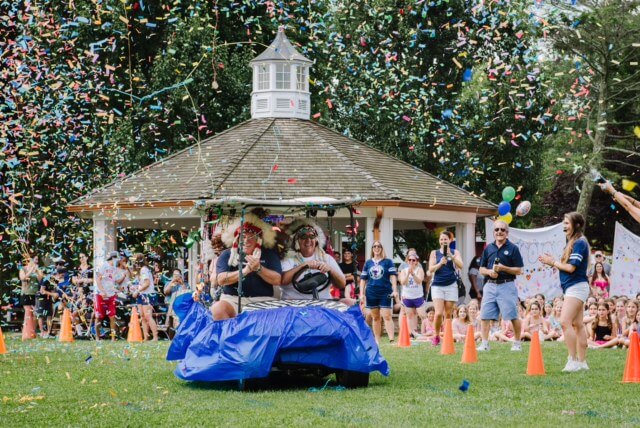
Happy 100th Birthday Pierce Day Camp!
When the airplane buzzed over Pierce Country Day Camp in Roslyn Wednesday morning, hundreds of campers turned their eyes to the sky to see it towing a surprise message: “Happy 100th Birthday Pierce Day Camp!”
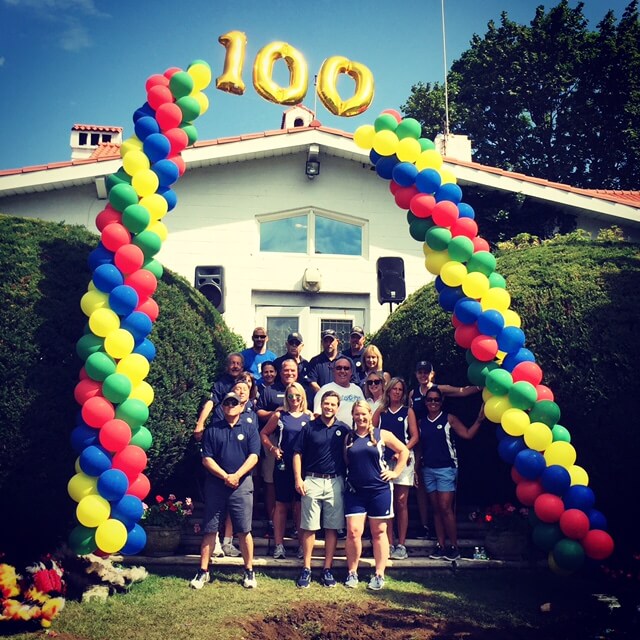
The plane was part of the family-owned camp’s celebration of its 100th summer — other activities included camp directors riding on a golf cart while shooting confetti; unearthing a time capsule buried 20 summers ago and replanting it with new items to be opened 25 summers from now; presenting an enormous 100th birthday cake; and singing tunes celebrating the camp and its milestone.
Inside the capsule, among other items, was an enormous banner that had been signed with messages from campers at Pierce 20 summers ago. Marie Pierce, 63, one of the camp directors, said she couldn’t believe the moment had finally come to open the capsule and mark the occasion.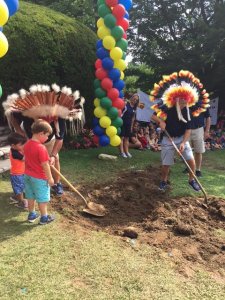
“It just seemed so far away and such a milestone. Here we are today. We’re passing the baton on to the fourth generation,” she said, referring to her daughter Courtney and nephew Will taking over the running of the camp that was founded by their great-grandfather, Forrester “Pop” Pierce, in 1918. The next time a capsule is opened at Pierce, Marie Piercewill be 88 and a fifth generation of Pierces may be running things. “I can’t believe that in 25 years my grandchildren will be in their 30s,” she said.
Festive banners surrounded the field Wednesday, made by the camp’s various age groups and held by their counselors. “Each group went to arts and crafts and we designed our own banner,” said Alex Prince, 19, of Howard Beach, who has been spending summers at Pierce since he was 3 years old and is currently a counselor for a group of 6-year-old boys. “Pierce is Having a Treemendous Birthday,” read the group’s banner, with the handprints of the 20-plus boys in the group. Treemendous is a play on the camp’s massive treehouse. Another group’s banner said, “May the Pierce be with you.”
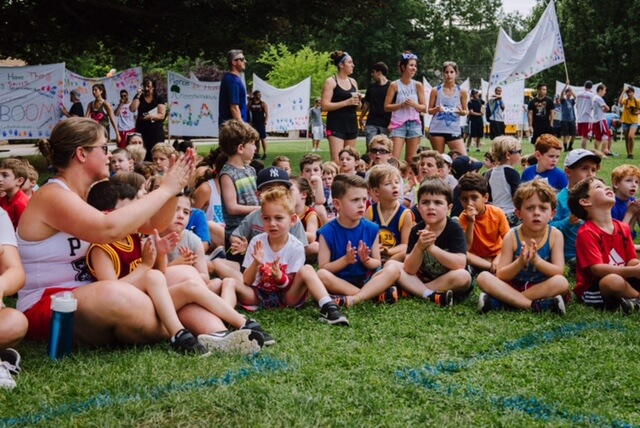
The time capsule and the airplane were the biggest hits for campers Alivia Saunders, 9, of Port Washington, and Victoria Zargari, 9, of Great Neck.
“It was unexpected,” Alivia said of the plane.
Victoria agreed. “We thought it was just a plane, but then we saw the banner. It had the Pierce logo,” she said. “It blew my eyes.”
“It was really, really fun,” Alivia said. “All my friends were here, and we had confetti and a cake.
We’ve Kicked Off Our 100th Summer!
Yesterday, we kicked off our 100th summer at Pierce Country Day Camp! We had a blast!!! Check out this quick video clip showing some of the FUN we had here at camp… you can feel the spirit, it was everywhere. It’s going to be an amazing summer!
I send my kids to sleep-away camp to give them a competitive advantage in life
Read the full article on the Washington Post website »
“Do you even like your children?” the woman I had just met asked me.
The audacity of the question took my breath away. I had been chatting with her, explaining that my kids go to sleep-away camp for two months every year.
I quickly realized two things at once: She was obnoxious, and she actually didn’t care if I missed my kids during the summer. She was talking about something else.
I didn’t have to tell her the reason I “send them away” for most of the summer is because I like them. They adore camp, and it’s actually harder on me than it is on them. I often tell people that the first year they were both gone, it felt like I had lost an arm. I wandered around the house from room to room experiencing phantom limb pain.
Now, instead of being offended, I got excited.
I was going to be able to tell her something that my husband and I rarely get to explain: We do it because we truly think it will help our kids be successful in life. With under-employment and a stagnating labor market looming in their future, an all-around, sleep-away summer camp is one of the best competitive advantages we can give our children.
Huh?
Surely, college admissions officers aren’t going to be impressed with killer friendship bracelets or knowing all the words to the never-ending camp song “Charlie on the M.T.A.” Who cares if they can pitch a tent or build a fire?
Indeed, every summer my kids “miss out” on the specialized, résumé-building summers that their peers have. Their friends go to one-sport summer camps and take summer school to skip ahead in math. Older peers go to SAT/ACT prep classes. One kid worked in his dad’s business as an intern, while another enrolled in a summer program that helped him write all his college essays.
Many (this woman included) would say that I’m doing my children a serious disservice by choosing a quaint and out-of-date ideal instead. There are online “Ivy League Coaches” that might say we are making a terrible mistake.
We don’t think this is a mistake at all. It might not be something to put on the college application (unless my child eventually becomes a counselor), but that isn’t the goal for us.
Our goal is bigger.
We are consciously opting out of the things-to-put-on-the-college-application arms race, and instead betting on three huge benefits of summer camp, which we believe will give them a true competitive advantage — in life:
1. Building creativity.
2. Developing broadly as a human being.
3. Not-living-in-my-basement-as-an-adult independence.
MIT’s Erik Brynjolfsson says, in his book “The Second Machine Age,” that we have reached a pivotal moment where technology is replacing skills and people at an accelerated pace. He argues that creativity and innovation are becoming competitive advantages in the race against artificial intelligence, because creativity is something a machine has a hard time replicating.
The problem is that creativity seems so intangible.
Steve Jobs once said, “Creativity is just connecting things.” He believed that people invent when they connect the dots between the experiences they’ve had. To do this, he argued that we need to have more experiences and spend more time thinking about those experiences.
Indeed. According to Adam Grant’s book “Originals: How Non-Conformists Move the World,” researchers at Michigan State University found that to receive the Nobel Prize, you need deep study in your field and those broad experiences Jobs was talking about. They studied the winning scientists from 1901 through 2005 and compared them with typical scientists living at the same time. Grant writes that the Nobel Prize winners were:
* Two times more likely to play an instrument, compose or conduct.
* Seven times more likely to draw, paint or sculpt.
* Seven-and-a-half times more likely to do woodwork or be a mechanic, electrician or glassblower.
* Twelve times more likely to write poetry, plays, novels or short stories.
* And 22 times more likely to be an amateur actor, dancer or magician.
You read that right. Magician.
It’s not just that this kind of original thinker actively seeks out creative pursuits. These original experiences provide a new way of looking at the world, which helped the prize-winners think differently in their day jobs.
The beauty of summer camp is that not only do kids get to do all sorts of crazy new things, they also get to do it in nature, which lends its own creative boost.
Most importantly, my kids have such intensely packed schedules full of sports, music, art classes, community service and technological stimulation throughout the school year that it makes finding these all-important quiet mental spaces more difficult.
Summers provide a much-needed opportunity for my children to unplug, achieve focus and develop those creative thought processes and connections.
Okay, okay. Creativity might be a compelling tool to beat out that neighbor girl applying to the same college, but what about this “developing broadly as a human being” stuff?
I didn’t come up with that phrase. Harvard did.
William Fitzsimmons, dean of admissions at Harvard, has penned a compelling letter to parents. It practically begs and pleads with them to reevaluate the summer extracurriculars race and to “bring summer back,” with an “old-fashioned summer job” perhaps, or simply time to “gather strength for the school year ahead.”
Fitzsimmons writes, “What can be negative is when people lose sight of the fact that it’s important to develop broadly as a human being, as opposed to being an achievement machine. In the end, people will do much better reflecting, perhaps through some down time, in the summer.”
In terms of “developing broadly as a human being,” summer camp can provide an impressive list of life skills.
Studies over the past decade have shown outdoor programs stimulate the development of interpersonal competencies, enhance leadership skills and have positive effects on adolescents’ sense of empowerment, self-control, independence, self-understanding, assertiveness, decision-making skills, self-esteem, leadership, academics, personality and interpersonal relations.
Now for the cherry on top: Independence.
Michael Thompson, the author of “Homesick and Happy,” has written, “… there are things that, as a parent, you cannot do for your children, as much as you might wish to. You cannot make them happy (if you try too hard they become whiners); you cannot give them self-esteem and confidence (those come from their own accomplishments); you cannot pick friends for them and micro-manage their social lives, and finally you cannot give them independence. The only way children can grow into independence is to have their parents open the door and let them walk out. That’s what makes camp such a life-changing experience for children.”
So, yes, Ms. Tiger Mom, I am letting my children walk out the door and make useless lanyards for two months.
They might not have anything “constructive” to place on their college application, but they will reflect, unwind, think and laugh. They will explore, perform skits they wrote themselves and make those endless friendship bracelets to tie onto the wrists of lifelong friends.
The result will be that when they come back through our door, we’re pretty sure that, in addition to having gobs of creativity and independence, they’ll be more comfortable with who they are as people.
And just maybe they’ll even bring back a few magic tricks.
Laura Clydesdale lives in Berkeley, Calif., with her husband and children. She blogs at lauraclydesdale.com. Follow her on Twitter @l_clydesdale.
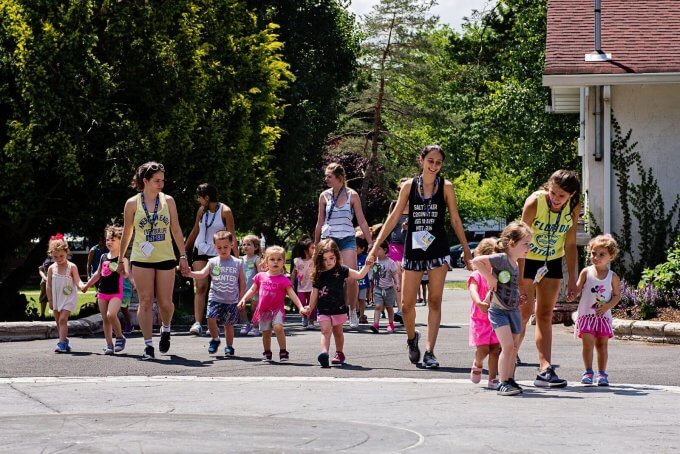
Working at Camp is the Best First Job
Written by Susie Lupert, Executive Director – American Camping Association New York & New Jersey
I’m always surprised when I speak with parents of high school and college-aged young adults about the summer opportunities they are hoping their child will secure for the summer. For the most part, they would like their child to get an internship or an office job to help them become successful in future employment. While many might feel working at an investment bank or a real estate firm would look better on their child’s resume, any future hirer who has worked at a summer camp knows that camp counselors gain important skills that today’s employers are seeking. I’m not discounting what a good experience these jobs can be, however, I know as a summer camp professional that the true hands-on learning that prepares young people for their careers happens when they work as a counselor at camp.
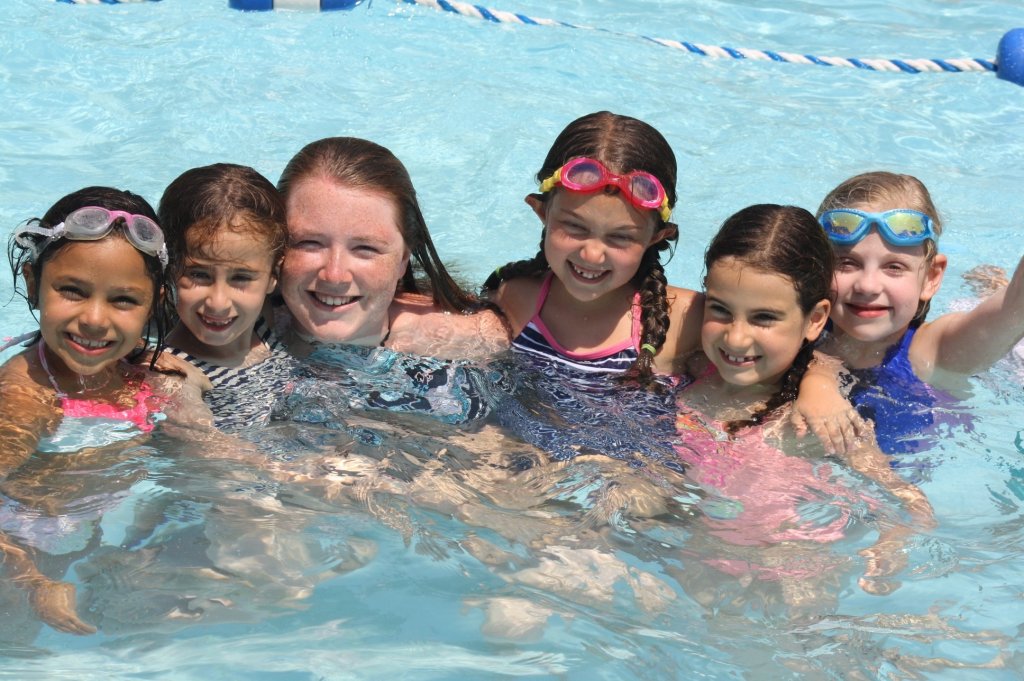
The Partnership for 21st Century Skills, a group of businesses, education leaders and policymakers including the U.S Department of Education, AOL Time Warner Foundation, Apple Computer, Inc., Cisco Systems, Inc. and others, found there is a large gap between the information students’ gain in school and the skills they need to succeed in the 21st century.
They performed extensive research on the skills they identified as necessary to becoming successful adults in life and work in the 21st century. Many of the essential skills needed for success are all fostered at camp including oral communication, collaboration, work ethic, creativity, leadership, social skills, problem solving and critical thinking.
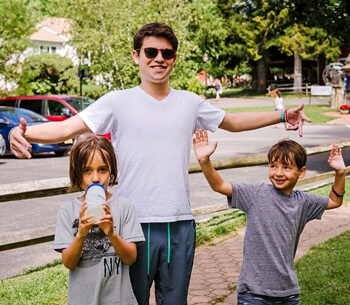 Each summer, counselors at camp are given many opportunities to gain important learning skills for future employment. They experience responsibility by leading a group of children and making sure all their needs are taken care of. Every day, staff make sure campers get to their activities on time, which helps them work on their time-management skills. Counselors are also constantly communicating about schedules and programs with the camp directors, fellow peers and dozens of campers each day.
Each summer, counselors at camp are given many opportunities to gain important learning skills for future employment. They experience responsibility by leading a group of children and making sure all their needs are taken care of. Every day, staff make sure campers get to their activities on time, which helps them work on their time-management skills. Counselors are also constantly communicating about schedules and programs with the camp directors, fellow peers and dozens of campers each day.
For a generation accustomed to texting every thought, counselors actually have to interact face to face, which hones their communication skills. There are many moving parts during a camp day with many activities happening simultaneously, meals being served to hundreds of campers and numerous children swimming in both the pool and the lake all at once. Young adults learn the importance of collaboration and teamwork to ensure everything goes smoothly — a camp simply wouldn’t function without each staff member working together as part of a team.
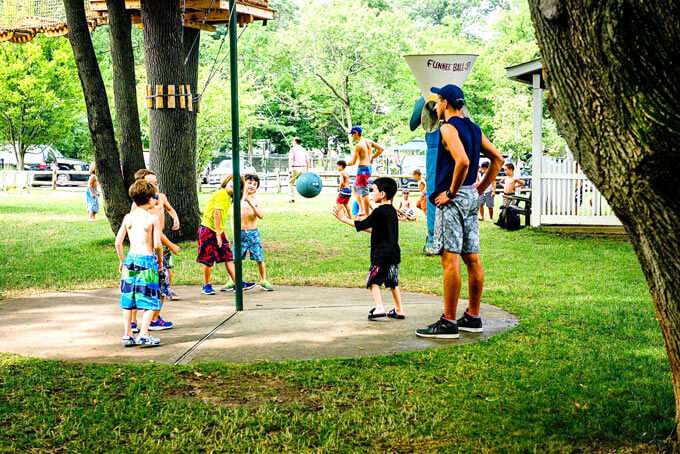
Throughout the year, camp leadership staff coordinates activities and special events for the summer, however, you can’t plan for everything. If it rains or children aren’t enjoying the activity as much as expected, counselors need to think quickly and switch gears. This allows young staff members to practice problem solving, a skill that every profession requires an employee to have.
There is no other job I can think of that empowers young people to gain such valuable skills and experiences that will help them in future employment than working at a camp. Forget the internship — encourage your child to apply for a camp job today.
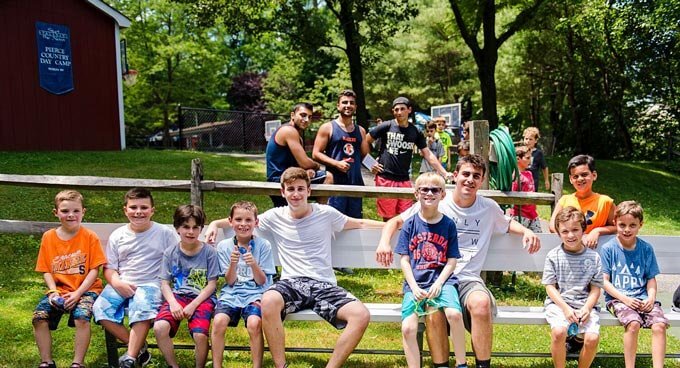
A Few Words from Owner/Director Doug Pierce
Well, the weather seems to have finally turned warm, so summer can’t be too far away! The fast approaching summer season is a very special one for all of us here at Pierce Country Day Camp as we reach the big milestone of our 100th summer anniversary. It has been a real joy of mine to work alongside so many wonderfully talented people and so many of my family members over my 45 year career. I have loved every minute of it!
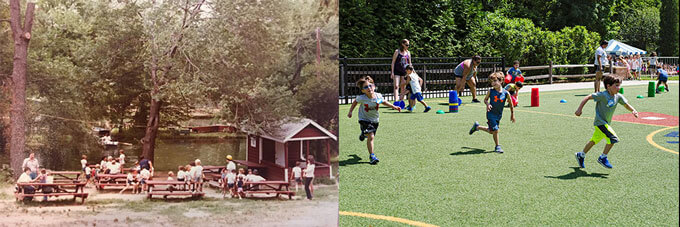
Over that length of time so much has changed physically on the camp grounds. Activities like boxing in the 50’s and 60’s no longer exists, nor does riflery or rocketry! Where our beautiful Clubhouse now sits used to be our outdoor gymnastics area and a playground. Today we have fabulous Waterworld, a Junior Olympic-sized indoor pool, air-conditioned dining rooms and buses, and a state-of-the-art athletic complex with a turf field! We sure have been busy improving our facilities and programming to meet the needs of our campers and their families… It’s been a whole lot of FUN!
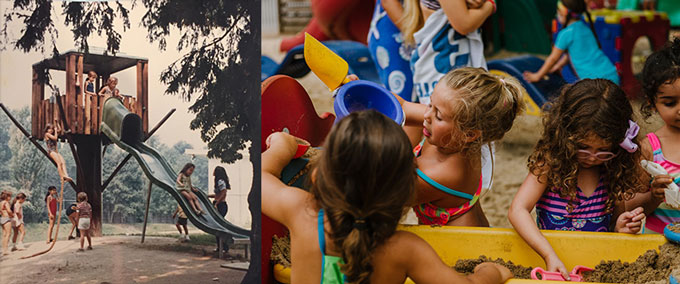
While much has changed physically over our long history, the original concept was designed by my grandfather “Pop” and continues to offer an orderly environment where kids can play, make friends, gain confidence and grow… this has really very much remained the same. Those same objectives and goals remain at the forefront of our philosophy today. Pierce is a place that smiles… Always has been! It is a place where there is something for everyone and success for all; a safe place to try new things, sharpen skills. It is a place where spirit soars and laughter roars! Summer Celebration 2017 is going to be an amazing summer! We are going to celebrate all summer long as we enjoy each and every day alongside each and every achievement by our great kids and staff.
On behalf of my family we thank all of you…families past, current, and future for being such a special part of this wonderful place. Together we have achieved so much, with so much more before us.
I am so very confident that the future growth and development of Pierce Camps is in extraordinarily capable hands as Courtney and Will take the reins of leadership as fourth generation owner/directors.
So, come on….Let’s Play!
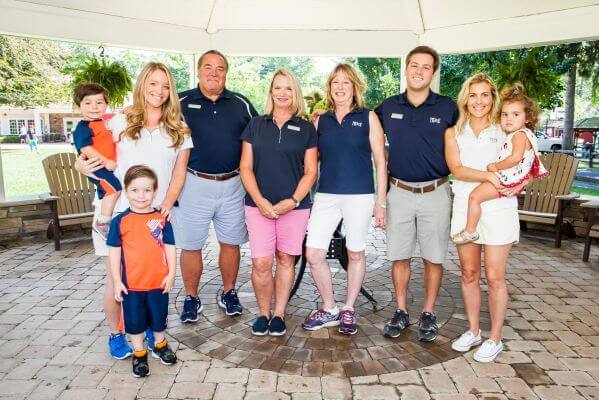
Pierce Country Day Camp in Roslyn celebrates 100 years
Will Pierce stands on a platform near the top of a telephone pole and peers w-a-a-a-a-y down into a hoop of fire. A hoop of fire he’s about to leap into.
He’ll pass through the flames and into a swimming pool at Pierce Country Day Camp in Roslyn. A camp owner-director braving the dramatic jump in front of campers and parents is a tradition masterminded by Pierce’s great-grandfather Forrester “Pop” Pierce, who founded the summer camp in 1918.
“The trick is to go through fast, like when you put your finger through a candle,” says Pierce, 32. “It’s a little bit scary, but mostly thrilling.”
When Pierce leaps this July, he’ll mark the 100th summer of Pierce Country Day Camp, which has been owned by four generations of the Pierce family. Will now runs the operation along with his cousin Courtney, also 32, and three members of what they refer to as “Generation Three” — Doug, 64, Greg, 60, and Forrester III, 59. Pop Pierce and the members of Generation Two are long gone.
More than 900 campers ages 3 to 13 now attend Pierce each summer, and they have included children of the rich and famous, such as Donald Trump’s 5-year-old granddaughter Arabella, daughter of Ivanka, who attended during the summer of 2016. In fact, one day last summer, in the midst of campaign season, Trump himself got her off the camp bus on her trip home to Manhattan, Forrester Pierce says, which amazed the bus staff. “As soon as they pulled away from the front door of the building, the phone rang here,” Forrester says, with the staff reporting the happening. “They were very excited.”
For decades, all of the Pierce family members have lived in homes either on the camp property or around its perimeter. “My cousins and I grew up like siblings,” Pierce says. “We would get home from school and run amok on the camp grounds. We were all counselors together.” And Generation Five has now begun — Will has a daughter, Brooke, 2, and is expecting another child this summer “right in the middle of camp,” and Courtney has two sons, Johnny, 4, and Charlie, 2, and is due with a third child in February. “I wanted to give my children the kind of family environment and experience I had growing up,” Will Pierce says. “I’m hoping one of my children will fall in love with the business and want to take it over like I did.”
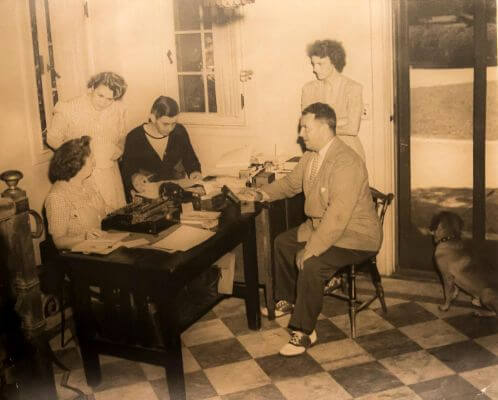
(Credit: Pierce Country Day Camp/Marisol Diaz)
Pierce is among the oldest day camps in the United States. “It’s rare for a camp to be in business for that long. Seventy-five years is an extraordinary amount of time,” says Susie Lupert, executive director of the American Camp Association, New York and New Jersey. The ACA is the accrediting body for U.S. summer camps. “It’s not just considered one of the oldest camps, but it’s also considered one of the best camps. They have been tireless leaders in the camp industry,” Lupert says. “They really are examples of people who are dedicated to youth development.”
Pictured: Helen Pierce, standing at left, with Forrester “Pop” Pierce seated at right, work with staff at Pierce Country Day Camp. The photo hangs in the hallway in the entryway of the mansion.
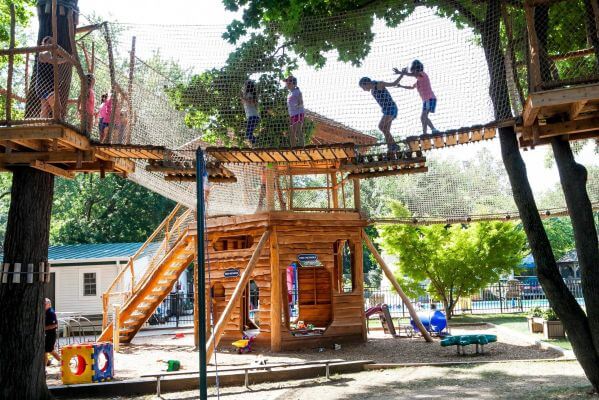
(Credit: Marisol Diaz)
Pop Pierce launched Pierce Country Day Camp in Deal, N.J., in 1918, moved the camp to rented property in Nassau County a few years later and then purchased an estate in Roslyn where he gave the camp its permanent home the 1930s. Pierce has grown to be among the biggest and most expensive camps on Long Island — eight weeks of swimming in the camp’s seven swimming pools, playing sports, making arts and crafts, shooting arrows at archery and more costs $8,950. Forrester Pierce says that’s so the camp can maintain state-of-the-art facilities — in 2016, for instance, the camp added an enormous treehouse called Treemendous and an outdoor “musical playground” dubbed Musical Rhapsody that includes a piano, xylophone and more. “That was just one year of capital improvements,” Will Pierce says.
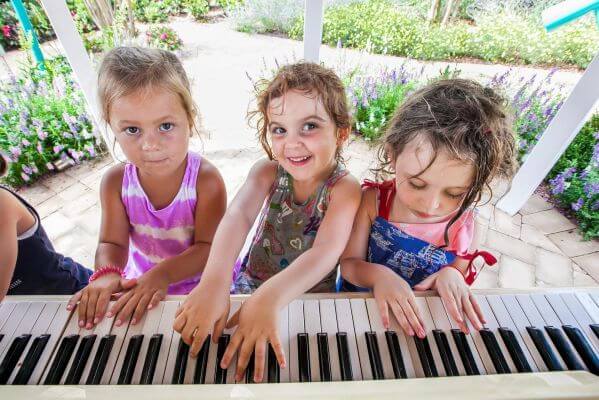
(Credit: Marisol Diaz)
Ron Katz, 64, of Woodbury, was a camper at Pierce in the early 1960s. He sent his daughter Kim London, 39, of Port Washington, to Pierce and she was also a counselor there. “There’s every single activity you could ever wish to participate in,” London says of the camp. “I was the kind of kid who was a jack-of-all-trades, master of none. For me, having a variety of activities throughout the summer was perfect for my personality.” London now sends her daughter Brooke, 5, to Pierce.
Pictured: Madison Rosen of Manhasset 4, Brooke Lubin 4, of Roslyn of Chloe Schmidt 4, of Roslyn play the piano at Musical Rhapsody Garden at the camp.
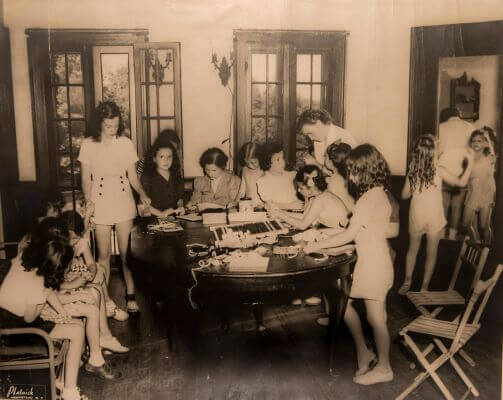
(Credit: Pierce Country Day Camp)
During the winter, Pierce runs a preschool on the grounds. It runs its own bus transportation company. The family also owns a sleepaway camp called Pierce Camp Birchmont in New Hampshire that’s now part of Will’s father Greg’s responsibilities and just celebrated its 65th summer. “A lot of people say, ‘What do you do for the other 10 months of the year?’ ” Will Pierce says. They do hiring, capital improvements, logistics and more.
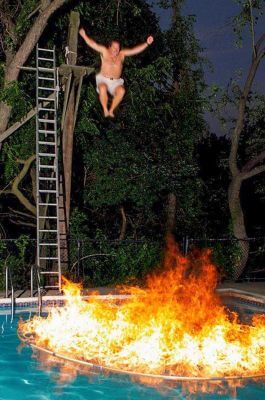
(Credit: Pierce Country Day Camp)
A Native American theme is part of the Pierce tradition — camp photos through the years show the Pierce men in feathered headdresses and Courtney Pierce in braids and Native American dress at traditional camp “Pow Wows.” “It’s part of our brand, the Pow Wows, the Native American motif, the ‘Hoop of Fire,’ ” says Doug Pierce of Generation Three.
Some summers over the decades stand out to the Pierces for a variety of reasons. During the summer of 1943, for instance, Yankee baseball legend Babe Ruth visited camp. During the summer of 1992, the camp buried a time capsule in honor of its 75th anniversary, which they will dig up this July. During the summer of 2014, the five current owner-directors participated in the Ice Bucket Challenge in front of the entire camp. “That was a fun moment because the camp loved it,” Forrester Pierce says. “Good old wholesome fun.”
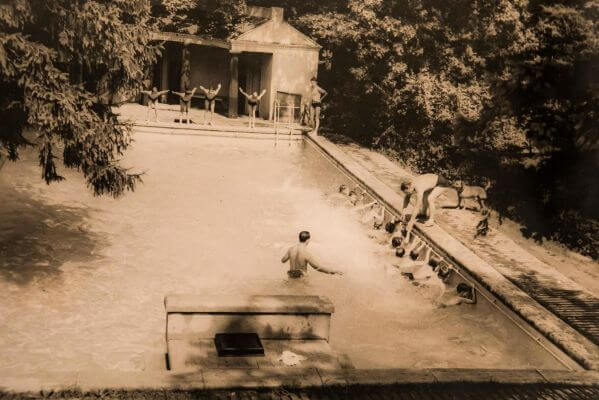
(Credit: Pierce Country Day Camp)
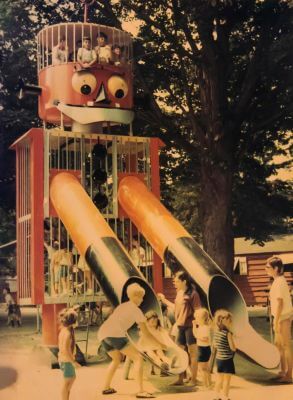
(Credit: Pierce Country Day Camp)
Pierce tries to keep a balance between maintaining the spirit of camp days of yore and meeting the demands of a providing a modern camp, Forrester says. The day camp still has the giant robot slide (pictured), for instance — “When we have parents come back with their kids they say, ‘Gigantor is still here!’ ” Courtney Pierce says — but has eliminated a former program in riflery — “That wouldn’t go over with the parents these days,” Courtney says.
These days, parental involvement is much greater than it was decades ago, Forrester says. The camp has nearly tripled its office staff to handle calls from parents asking about transportation, suntan lotion, hydration and more, Forrester says. And for kids, the scheduling of activities is broader — the camp has added a STEM program and a theater program, for instance.
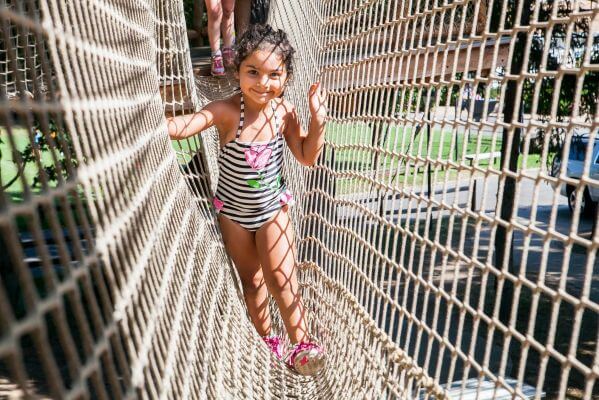
(Credit: Marisol Diaz)
Pictured: Laylah Kaypour, 4, of Port Washington walks the bridge on Treemendous in Pierce Country Day Camp in Roslyn, Aug. 19, 2016.
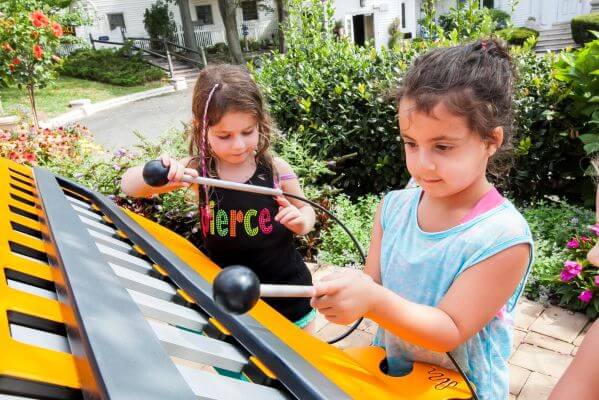
(Credit: Marisol Diaz)
Though Forrester Pierce says he spends much of the camp day in the office, he takes a lap around the camp grounds at least twice a day during the summer. “You hear the kids squealing and laughing,” Forrester says. “Nothing can bring a smile to your face more than listening to happy kids.”
Pictured: Sophie Weiss of Roslyn and Emma Forchheimer of Roslyn play xylophone at the camp’s Musical Rhapsody Garden.
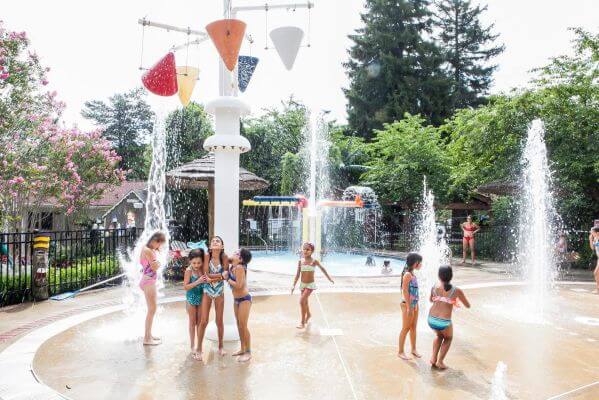
(Credit: Marisol Diaz)
That’s made it worth the fact that for every single summer of his entire life he’s been working at the family’s camps, Forrester says. “I begged my father in college to have a summer off to drive cross-country. He said no. Once I retire, we will drive cross-country. I’ll be able to live that dream. It’ll be 45 years later, that’s all.”
Pictured: The camp’s Water World.
Four generations have been involved in running Pierce Country Day Camp, which has been in operation since it was founded by Forrester “Pop” Pierce in 1918.
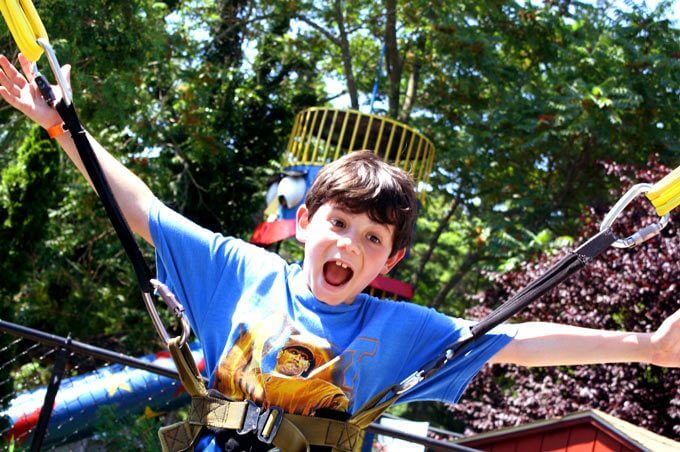
10 Most Awesome Things About Camp
Our favorite things about camp, straight from our annual Camp Guide!
Summer camp provides children with an amazing summer experience, making it difficult to narrow down the reasons why camp is so great. Here is a list of ten awesome things about summer camp. I’m sure after one summer at camp, your child will be able to come up with dozens of more ways that the camp experience is so awesome!
- Gain skills in a range of activities – Whether your child goes to day or sleepaway camp, your child will participate in a variety of activities including swimming, waterskiing, tennis, boating, ropes course, and so much more. Your child will try new activities that he or she may never have had a chance to try.
- Gain life skills needed to be a successful adult – According to research done by the Partnership for 21st Century learning, the skills needed to be successful in the 21stcentury include communication, creativity, leadership, responsibility, and collaboration—all skills incorporated into many summer camp programs. At camp, children develop these skills needed to become secure, contributing, successful adults. “Camp isn’t just about sports, arts, and waterskiing. The true heart of the camp formula is the well-being of the camper,” comments Scott Rothschild, director of Kenmont and Kenwood Camps, brother/sister overnight camps in CT. “Camp provides children with many growth opportunities that really fuel the success of a camper like helping them make individual decisions, learning to work well with others, being a leader, gaining confidence, and building confidence.”
- Children can reinvent themselves – At home, children have gone to school with the same children for years and children may be labeled as the shy or the athletic one. At camp, your child can reinvent himself. Camp is an accepting community and a child can be themselves at camp.
- Build Resilience – Camp gives children many opportunities to build resilience. “At camp, children are exposed to many new activities and things they may have never done before. The definition of success at camp is simply that a child be willing to try these new things,” says Will Pierce, an owner and director of Pierce Country Day Camp and an owner of Pierce Camp Birchmont, an overnight camp in NH. “Unlike in other environments, there is no expectation that to be successful a camper also has to be good at them. When you have a community that is intentionally structured to make the goal attempting to do something, rather than succeeding at something, you increase the opportunities to build resilience. Our campers know that just by attempting to climb the wall or shoot an arrow, they are succeeding. It makes them that much more willing to try something, and even if they fail, to try it again. Eventually they can climb the wall a little higher, or hit the target a little closer to the bullseye, and together we’ve not only achieved a measure of objective success in the activity, but more importantly we’ve built a whole lot of resilience along the way.”
- Meet new people – Camp fosters deep friendships and allows children to meet children from different communities as well as from around the world. Children also have the opportunity to relate to people of all ages at camp.
- Self-reliance– Today’s children are in constant contact with their parents through texting and cell phone calls. Camp gives children a healthy separation from their parents, fostering independence. “Simple chores like making a bed, sorting laundry and even picking out their clothes for the day are important tasks that children learn when they are at camp and away from their parents,” says Scott Rothschild.
- Unplug from technology – According to a Kaiser Family Foundation survey of young people, children spend 7.5 hours a day engaged in electronic media including cell phones, computers, TV, and video games. Instead of engaging in human interactions, children are staring at screens throughout the year. The majority of summer camps have a no technology rule. Will Pierce says both Pierce Country Day Camp and Pierce Birchmont are unplugged. “We have a no technology rule for the basic reason that electronic devices seemed antithetical to many of the core values of camp: being outside in nature, focusing on the people in our community who are present, and trying new activities we don’t have at home. Young people often feel a lot of pressure to be constantly up to date and engaged with their peers via social media and texting. Camp has become a welcome break from that pressure and has positively influenced the way they view and use their electronic devices. Campers and staff members have actually thanked us for creating a community where everyone is required to take a break from their phones.”
- Children communicate face-to-face — “Because we live in such a technological age where everyone is wired via computers and phones, camp is truly ‘the last frontier’ where campers and staff can flourish as talkers and not online communicators,” comments Rothschild. “Our campers and staff connect through daily conversations at activities, evening campfires, flash light time before bed and even in the dining halls during our energetic mealtimes. Camp creates conversations that are person-to-person, not iPhone-to-iPhone.”
- Traditions – Many camps celebrate special traditions and rituals each summer. Children partake in these rituals such as color war, candles on the lake, and singing songs. These activities connect children to the generation of campers who came before them and to the history of the camp.
- Camp is fun – At camp, children are allowed to play in a safe and nurturing environment, and are allowed to just be kids. Play is a powerful form of learning that contributes mightily to the child’s healthy physical, emotional, social, and intellectual development. According to an American Academy of Pediatrics report, creative free play protects a child’s emotional development and reduces a child’s risk of stress, anxiety, and depression.
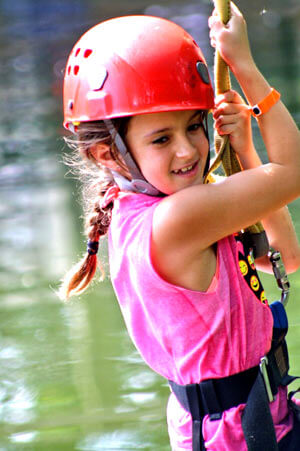

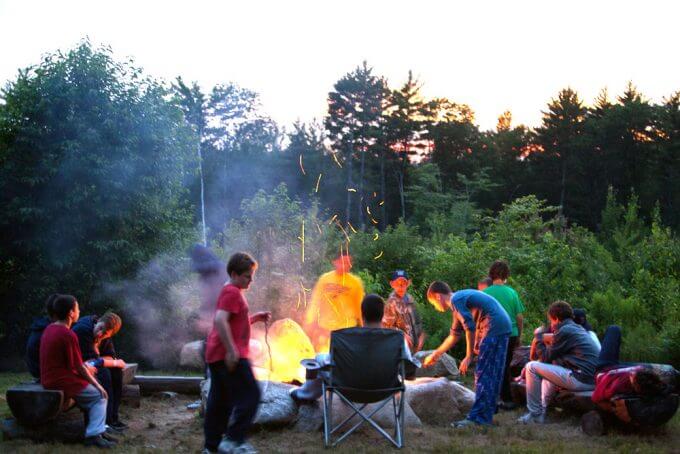
I Love My Kid – That’s Why I Send Him Away For the Summer
“I could never,” the stranger in line in front of me at Target exclaimed with her hand clenched against her chest.
Moments earlier, she overheard me on the phone asking my 10-year-old son how many tubes of sunscreen he went through last Summer and if he needed a new fan this year. She asked where we were headed, which, based on the overflowing nature of my shopping cart, I understood. I laughed, telling her it wasn’t “we” – it was “he.” He was going to sleepaway camp for the Summer and I was trying to get a head start on packing. That, of course, led to questions about how long and where and why. To which I answered, seven weeks, five hours away, and because we love him and want him to experience all that camp has to offer.
That’s when she made her comment. I decided it wasn’t worth any more discussion – I had my reasons and didn’t need to explain them to a stranger – but it did get me thinking. Why do we ship our children away for the Summer?
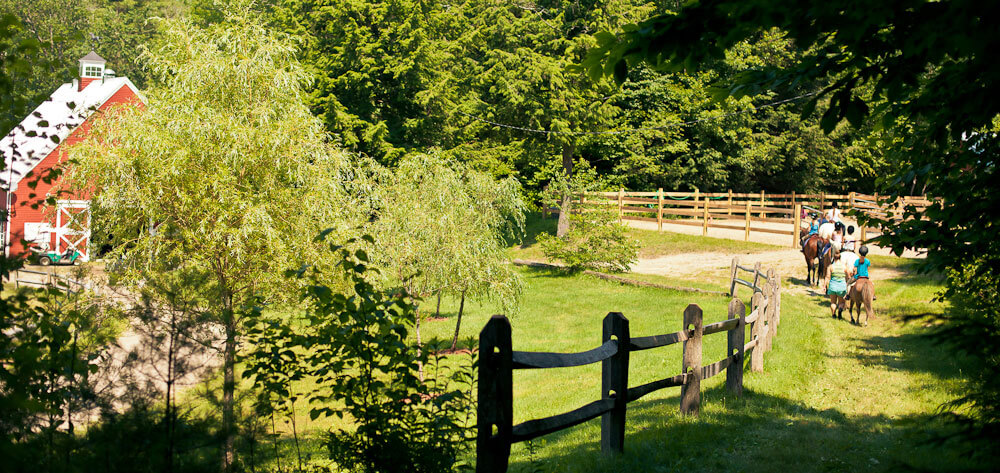
Both my husband and I went away to camp when we were kids, me for four weeks each Summer and him for eight. Ask us, or really any other kid who did so, and they’ll probably tell you those were the happiest days of their childhoods. We can still sing the songs, tell color war stories until your ears fall off, recall first crushes … and first kisses, and remember the distinct smell of the dining hall and the slimy bottoms of the lakes.
What we didn’t realize at the time was everything else we learned. We learned independence. We learned to care for ourselves. Yes, there were counselors there overseeing everything, but we really did learn how to handle so much on our own. Without parents there, we learned to make new friends. We put ourselves out there and tried new activities and new foods. We learned a bit about ourselves without even realizing it.
These are the lessons I want my sons to learn – once both are old enough to go (my youngest is still too young). Being away from home is a time to learn about yourself outside of the comforts and security of home. It’s a time to learn to bask in the uncertainty of what comes next or who will be sleeping in the bed next to you. In this age of connectivity, where there’s always a phone, computer, or tablet in sight, it’s a forced break from that. My son’s camp does not allow any electronics and I couldn’t be more grateful. Camp is a time to re-create the carefree days of childhood that my kids’ grandparents – and even their great-grandparents – experienced all those years ago. As city dwellers, it’s also a chance for my kids to experience nature – not at a museum or a park surrounded by buildings, but nature in its natural state.
And, let’s be frank here: it’s always a great break for us, the parents. The hustle and bustle of the school year is exhausting. And by the time the Summer rolls around, we could all use a break from each other. Yes, I spend half my day scrolling through the photos the camp posts for any sign that my child is happy, sad, or really just clean! But the time apart proves that absence does make the heart grow fonder.
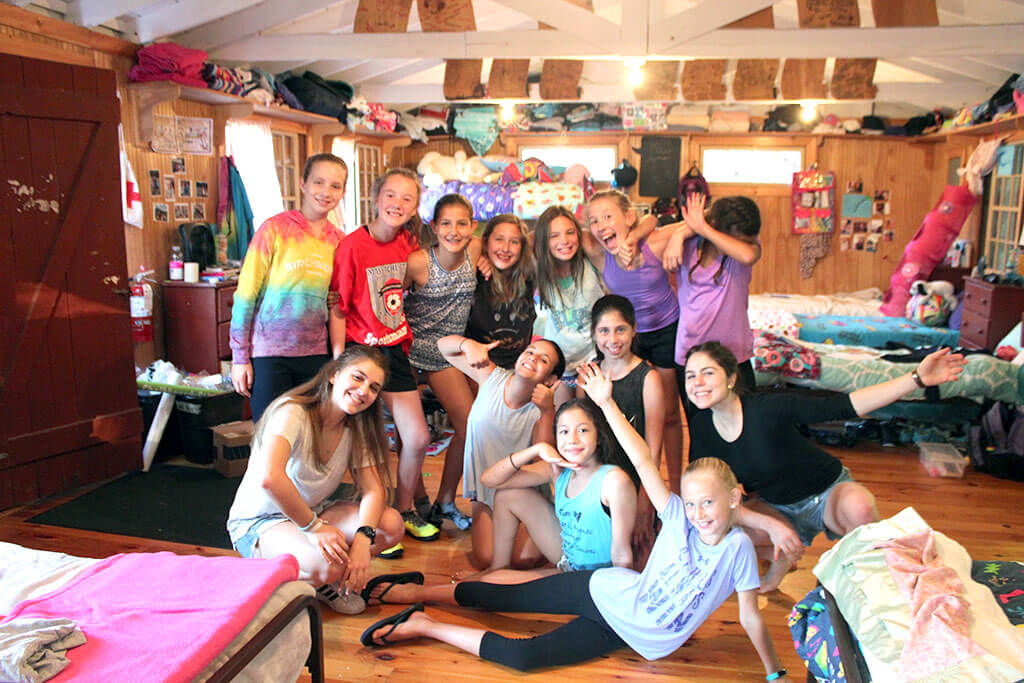
Last year, my oldest went off to camp for the first time. He didn’t know a soul. He sat on the bus with a boy he had met a few minutes earlier and a few days later I got a letter from him that he was loving it. He had already gone camping, canoeing, and water skiing – three things he’d never done in his life. He was playing street hockey and tennis and eating s’mores each night. And the kid I had to drag out of bed each morning for school had joined a Polar Bear club where they jump in the lake first thing every morning. In the matter of three days, he was already making memories. Five weeks later, he was begging us to extend his Summer to the full seven weeks away. We told him we thought he’d had enough for his first Summer, but would gladly do it for the next. Right now, he’s counting down the days on his calendar.
In shipping my kid away for the Summer, I’m giving him something special, whether he knows it or not right now. Just a few weeks ago, we were having one of our frequent arguments about something trivial. He suddenly blurted out that the reason I send him to camp is to “get rid of him for the Summer.” And while in that moment it may have rung true, I told him that wasn’t the case at all – that camp is hardly punishment; it’s a privilege and he’s very lucky to be able to go, that I would never spend the money I do on a camp if it was punishment.
So while the woman in line at Target may never understand why we send our kid to camp, I can think of a thousand reasons. But the best reason is that we’re doing it for him. There’s a saying the campers like to say: “We live 10 months for two.” I can’t think of a better sentiment.



